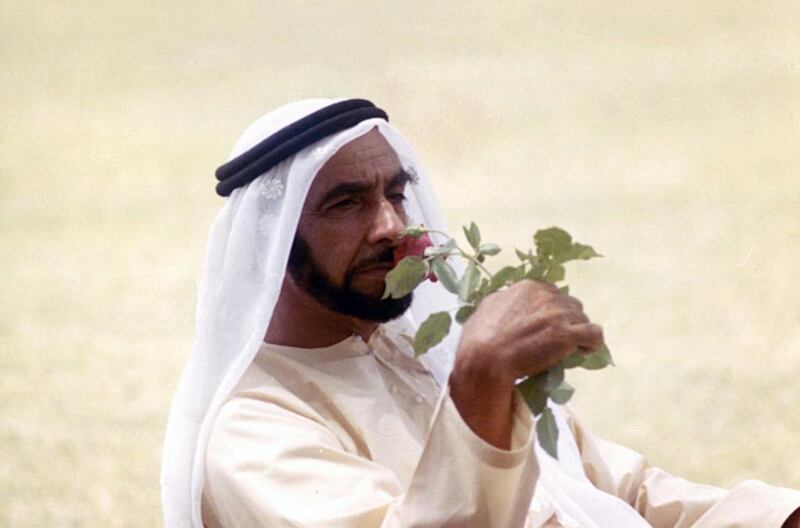It is the mission of the National Archives to protect the heritage of the United Arab Emirates as a trustworthy source of information to both decision makers and the general public while promoting civic spirit and a sense of national identity.
Among our collection is an extensive and quite remarkable collection of primary source materials that chronicle the life and prodigious achievements of Sheikh Zayed bin Sultan Al Nahyan, from his time as the Ruler’s Representative in the Eastern Region, then Ruler of Abu Dhabi and finally President of the UAE.
Our collection comes from such diverse sources as the archives of Qasr Al Hosn, the Cultural Foundation, the British National Archives and several private collections.
According to one description in a 1957 British foreign office report that is part of the collection, Zayed was: “The most efficient, most powerful, most generous, and most popular of all the Sheikhs of the Trucial States. No Sheikh on the Trucial Coast is more courteous and forthcoming to the British or adjusts himself better in their ways.”
As the Ruler’s Representative in Buraimi, he was uniformly respected and loved by the tribesmen and his influence rapidly spread throughout the Buraimi area because of the successes achieved despite his meagre resources.
Following his succession as the Ruler of Abu Dhabi and later President of the United Arab Emirates, he grew to be a globally respected leader through his integrity and charismatic personality. However, he never deviated from the principles that moulded his leadership style; his impeccable Arab manners and generous contributions to the welfare of people in many countries.
Every aspect of Sheikh Zayed’s life and rule is reflected in the films, images, and sound recordings held at the National Archives. Sheikh Zayed’s attendance at school graduation ceremonies, the opening of new universities, regional and international visits and meetings, and his participation in the lives of every one of the people of the United Arab Emirates are all captured in still photographs and on film. In addition, there are informal family gatherings and his meetings during his many tours of the nation.
We are proud to share a selection of these photographs with you today, as the nation marks the 10th anniversary of Sheikh Zayed's death on the 19th of Ramadan in the Islamic year 1425.
While only a small part of those held in the National Archives, these images, we believe, preserved for future generations, capture something of the character of the man most know simply as the Father of the Nation.
Here is Zayed with his people, with the children he loved and knew to be the future of the UAE and away from the palaces and protocol, outdoors, in the desert and the sea, tending his plants and cherishing the environment.
These images and the words of Zayed that accompany them help us remember the extraordinary achievement of his life, which continues to shape the country we live in today.
Dr Abdulla El Reyes is director general of the National Archives.
Sheikh Zayed, in his own words
“We pay the utmost care and attention to our environment for its is an integral part of our country, our history and our heritage..our forefathers and our ancestors lived in this land and coexisted with its environment, on land and at sea, and instinctively realised the need to preserve it.”
“Experts didn’t encourage agriculture. They said it would be impossible to grow crops in our land and in a climate like ours, but we decided to try anyway and Allah helped us. We were able to transforming our region into a green region, and this encouraged us to continue our efforts.”
“I love the desert. I go there whenever I’m tired to restore my energy. I meet my Bedouin brothers whom I love with all my heart because they are still pure and clean, and they still hold on to their customs and traditions that stem from genuine Arab traditions and the teachings of Islam.”
“A true leader is that who thinks of his people as members of his own family. He cares for them and looks after them at all times.”
“I always wanted to serve my countrymen. I thought about their welfare even before I got to power and before I had the capabilities that Allah blessed us with the discovery of oil.”
“Responsibility is momentous; it is no easy feat. Let alone the responsibility for an entire population, which I have indeed shouldered throughout the years.”
“It was with wisdom, deliberation, and faith in Allah and the Nation that we were able to take firm steps towards progress, for we believe unity and solidarity are the pillars of strength for the people of this region.”
“Money for us isn’t an end in itself, but the means to serve the people.”
“The state gives priority to developing of the human element and the welfare of citizens everywhere. Citizens are the true resource on this land.”
“Our constant thinking of the past and all its has granted us, of the present and all the hopes that come with it, and of the future and all of its bright aspirations will lead us at all times to build our country, its progress and its development.”
“Each official shall be held accountable for his work. There is no difference between a high-level and a low-level official because an official’s value is measured by the obligations he meets and his commitment on fulfilling his responsibilities, pursuing the Union’s goals and achieving the people’s aspirations.”
“The work we do for our nation in this life is the best thing we bring with us to the afterlife.”
From Zayed: A man for history, by Ali bin Salem Al Kaabi, published 2011






